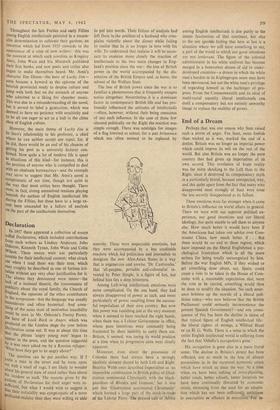Declaration
In 1957 there appeared a collection of essays called Declaration, which included contributions from such writers as Lindsay Anderson, John Osborne, Kenneth Tynan, John Wain and Colin Wilson. These essays were not particularly notable for their intellectual content; what struck me when I read them was their tone, which maY roughly be described as one of furious irri- tation without any very clear justification for it. The abuses they denounced were minor—the lack of a national theatre, the tiresomeness of Publicity about the royal family, the Church of tngland, the opinions of the other contributors to the symposium—but the language was usually immoderate and often hysterical. And some- thing of the same state of motiveless irascibility could be seen in Mr. Osborne's Jimmy Porter, the hero of Look Back in Anger, which was Produced on the London stage the year before bec/aration came out. It was, at about this time that the phrase 'angry young men' began to by in the press, and the question suggested bY it was once asked me by a Russian refugee: `What have they got to be angry about?' • The question can be put another way. If I Jostle a man in the street and he turns upon Inc with a snarl of rage, I am likely to wonder about his general state of mind rather than about the incident as such. The reasons given by the authors of Declaration for their anger were in- sufficient, but what I would wish to suggest is that their irritability was symptomatic of a more Profound •malaise than they were willing or able to put into words. Their failure of analysis had left them in the position of a husband who com- plains violently about the dinner while failing to realise that he is no longer in love with his wife. To understand that malaise it will be neces- sary to examine more closely the reaction of intellectuals to the two main changes in Eng- land's position since the war: the loss of British power in the world accompanied by the dis- solution of the British Empire and, at home, the advent of the Welfare State.
The loss of British power since the war is so familiar a phenomenon that it frequently escapes notice altogether. Nevertheless it is a dominant factor in contemporary British life and has pro- foundly influenced the attitudes of intellectuals —often, however, without their being conscious of any such influence. In the case of those few situated politically on the Right the reaction was simple enough. There was nostalgia for images of a flag lowered at sunset, for a pax britannica which too often seemed to be replaced by anarchy. These were respectable emotions, but they were' accompanied by a less creditable reaction which led politicians and journalists to denigrate the new Afro-Asian States in a way that is ungenerous and unwise. 'Dr. Castrumba; that 'all-purpose, portable anti-colonialist' in- vented by Peter Simple, is a figure of fun, but behind him lies a deep bitterness.
Among Left-wing intellectuals emotions were more complicated. On the one hand, they had always disapproved of power as such, and more particularly of power resulting from the success- ful imperialism of their own country. But now this power was vanishing just at the very moment when it seemed to have reached the right hands, when there was a Labour GoVernment in office, whose pure intentions were constantly being frustrated by sheer inability to carry them out. Britain, it seemed, was losing its world position at a time when its progressive aims were clearly apparent.
Moreover, even about the possession of Colonies there had always been a strongly idealistic element shared by both Left and Right. Beatrice Webb once described imperialism as 'an impossible combination in British policy of Glad- stonian sentimental Christianity with the black- guardism of. Rhodes and Jameson,' but it was just that 'Gladstonian sentimental Christianity' which formed a large part of the stock-in-trade of the Labour Party. The present cult of Africa among English intellectuals is due partly to the innate fascination of that continent, but also to the not ignoble feeling that here at last is a situation where we still have something to say, a part of the world to which our good intentions are not irrelevant. The figure of the colonial administrator in his white uniform has become merged in a benevolent dream of aid to under- developed countries—a dream in which the white man's burden in its Kiplingesque sense may have been renounced, but not the white man's privilege of regarding himself as the harbinger of pro- gress. From the Commonwealth and its ideal of multi-racial equality liberal intellectuals can distil a compensatory but not entirely unworthy image to replace the realities of power.






































 Previous page
Previous page